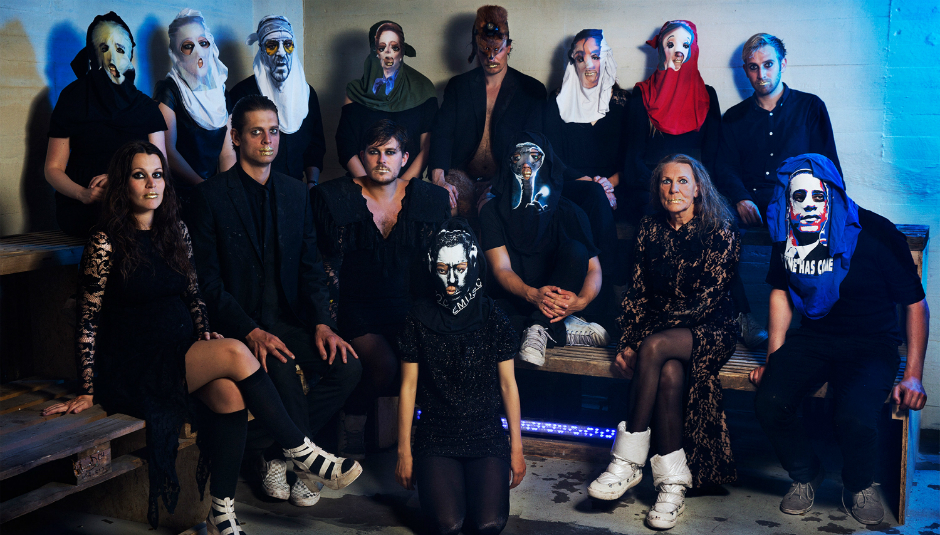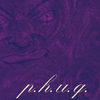When you’re asked to think of a stereotypical opera, your thoughts might turn to Rigoletto, La Bohème, or The Marriage of Figaro. It could be men and women wearing Regency clothing, tales of romance, with maybe a little bit of comedy thrown in for good measure. Or it could simply be Pavarotti belting out ‘Nessun Dorma’. But the image you conjure probably isn’t of a 60-capacity nuclear bunker underneath The Copehagen Municipal Hospital. Yet that’s where Danish band Efterklang and composer Karsten Fundal first staged their opera Leaves – The Colour Of Falling.
Needless to say, composing a traditional opera wasn’t high on the agenda for either Efterklang or Fundal when creating Leaves, a challenging, thought-provoking, and yet often beautiful collection that combines orchestral and operatic elements with experimental rock elements. While it may occasionally contain some more orchestral numbers, such as at first muted but ultimately dramatic ‘Imagery Of Perfection’ and the haunting ‘Spider’s Web’, the collaborators push the boundaries of both classical and rock music from start to finish. Whether it’s the swooning, percussion-heavy opener ‘Cities Of Glass’, the lullaby-like xylophone on the title track, or the bursts of clattering, stabbing noise on closer ‘Wind’, there’s always something constantly surprising to hear.
In fact, doing exactly the opposite was high on the list of priorities. The director of the Copenhagen Opera Festival was the first to suggest potentially putting on an opera underneath the Municipal Hospital in an interview, before he’d even approached Fundal to ask if he’d be interested. But once asked about the opportunity, Fundal knew he didn’t want to stage an ordinary opera. “It was a very mandatory thing for me not to do an opera in the usual sense. We didn’t really want to make it into an ‘opera opera,’ we just wanted to do a piece of music!” Fundal explains. “We just wanted to do what we wanted to do, not being restricted by any stylistic rules or operatic behaviours. I think the singers were on board with that too.” Having worked fairly extensively with Fundal in the past, Efterklang were also keen to do away with the dusty old notions of opera, instead opting for a more intuitive approach. “As with all our work with Karsten, we like to hit this middle ground and we try to focus on this emotional state between us,” says Casper Clausen. “It’s always about using music as an emotional tool, it’s something profound that connects us. It should be relevant in that way.”
Unsurprisingly, Leaves doesn’t follow the typical narrative of a traditional opera. Split into different acts, it focuses on a group of people that have gone into exile underground after an unknown apocalyptic event happens on the surface. There they form something of a cult, performing rituals in the hope of gaining eternal life (this definitely isn’t The Magic Flute). However, the origins of Leaves lies in a very different world altogether, removed from real life. “My idea from the start was about making a cyber opera,” Fundal explains. Indeed, Fundal’s initial idea was to set the opera around Second Life, the once incredibly popular online virtual world that was like a cross between The Sims and online multiplayer games such as World Of Warcraft. “At that time Second Life was supposed to have a future that it apparently didn’t have. But I wanted transform this cyber world into an opera world and thereby rebirthing this reality.”
As time went on though, the opera soon became a different beast, taking on a whole new meaning within the real world. “It became more about this cult underground, and about people hiding underground because of an unnamed catastrophe. In that way we started working on this idea of the lost people sustaining life in the cellar,” Fundal continues. Efterklang came on board with the project when Fundal was working on the concept of the post-apocalyptic cult. “Karsten led us into this universe of the apocalypse of these people living underground. But the title also hints about nature and the leaves,” Clausen says. Fundal then sent over some material for Efterklang to work with and the results were predictably impressive. “Over two months I got three songs and it was amazing, because I couldn’t imagine what they’d do. But it was completely beyond my imagination!” Fundal says. “It was really intriguing and just proved once again how we worked very well together. We work in different ways but it’s not alien to my style or alien to my world. In that way, we could transform something into something else.”
To bring Leaves alive, though, Efterklang and Fundal brought in more people to collaborate with them; the musicians and vocalists they eventually brought in to perform would form the Happy Hopeless Orchestra. But one of the most important aspects of any opera are its lyrics, and so Fundal drew on the expertise of his old friend, poet Ursula Andkjaer Olsen, to write them. “She’d become quite a big writer, and I found it very appropriate to ask her because she knows a lot about music; she’s been a music critic for years,” Fundal says. It wasn’t just Olsen’s connection to music that convinced Fundal she was the right choice for the opera though. “She has this very poetic and very simple way of expressing herself in an advanced way,” he explains. Indeed, Olsen’s lyrics for Leaves are not like anything you’d expect from a more traditional opera. Her words are deceptively simple and often centre on certain themes, with the specific motif of greenery consistently reappearing across the songs. ‘Cities Of Glass’ frequently mentions flowers, while on ‘The Colour Not Of Love’, green becomes “the colour of falling.” Olsen’s lyrics highlight the different aspects of falling and nature, how they can represent both life and death, and the beauty that comes with that. As Clausen says: “Karsten was explaining to us about the picture of beauty as also being closely related to death, like when you see a sunset and it’s fading. That’s the beauty of it, that it’s only there for a few moments.” “This is why it’s called ‘leaves.’ The falling leaves. It’s poetic scripture, the idea of death and that we slowly approach death,” Fundal adds.
Falling didn’t just become a large theme within the lyrics though; Fundal and Efterklang made sure that the motif was continued through the music. To begin with, the group started to work with instruments and sounds that could replicate the motion of a fall. “The first ideas I remember was an idea for slides, for notes falling, and this is a refrain in the music,” says Clausen. “It’s very present and it kind of goes throughout the whole album and opera, this fading note. That became a counterpoint.” But it was the original setting of the underground bunker that really helped them to uniquely capture a sense of falling in the music. “The room had a natural reverb that was really extraordinary and that amazed us all,” Fundal says. “We went into the room several times beforehand and it became apparent to me that we should use that.” Knowing that the bunker would have a very specific impact on the music, the group deliberately went about playing descending notes on various instruments, heightening their effect with the its natural atmosphere to create something akin to voyaging into the depths. “It’s hard to explain, but you’d have a note but you’d still have the pitch of just before,” Fundal says. “We used slide whistle, sliding strings and my friend, who plays the accordion, has a special kind where he can imitate this idea of descent. That way we could have this underworld idea.”
As is to be expected from an opera though, the group of singers on Leaves have an immense impact. Both Efterklang and Fundal had worked with soprano Katinka Vindelev before (she has been a member of Efterklang on tour, providing vocals and piano, and worked on Fundal’s piece Liquid Rooms); she sang the lead on the minimalist ‘Stillborn’. However, the rest of the vocalists came together gradually. Nicolai Elsberg, for instance, came as a recommendation from Vindelev. “He has an extraordinary deep bass. He has an amazing voice,” Fundal comments. One of the biggest surprises came from soprano Lisbeth Balsev, who gave one of the most memorable performances. “One of the most intense moments of the opera was to see her sing, and her ire, being up front in people’s faces and getting into their heads. It doesn’t matter if they hadn’t seen opera before, they’d have this feeling of being scared and fascinated, not knowing how to react,” Clausen says. “She was completely ready to break expectations, she was actually the most wild of them all!” Fundal adds. Having someone like Balsev on board helped to give Leaves an added element of intensity, and draw the audience even further into the twisted world that Efterklang and Fundal had created. “That made it relevant in a way, it gave it something. It had danger and it had relevance and was convincing,” Clausen adds.
Even despite their reputation for experimenting and working in a variety of fields, for Efterklang the experience of working with so many different musicians from the classical and operatic world was an eye-opening affair. “It was fascinating to do work with all these voices,” Clausen says. He was struck not only by the performers’ professionalism, but also their progressive attitudes towards what Fundal and Efterklang were trying to achieve. “We were fortunate enough to work with people who already have a lot of integrity already but are also very curious and open minded.” Indeed, the members of the Happy Hopeless Orchestra weren’t just performers, they also became collaborators, inputting ideas and expertise to create a truly communal experience. As Clausen highlights, “these people are very quick and smart and know how to transform it, but also it was a very close collaboration all the way from theory to execution. It became something we could not have imagined.”
Having played 16 sold out nights in the Municipal Hospital’s bunker in 2015, Efterklang, Fundal and the Happy Hopeless Orchestra are releasing Leaves as an album. It was never originally their intention to put the opera on to record though. “We didn’t think about an album when we did the opera, but as we went through this process, we just thought ‘this needs to be documented’,” says Clausen. The way that Leaves transformed itself into something much bigger and more powerful than Clausen or Fundal could have imagined has led to them creating a record of their achievements. “We started, us and Karsten, imagining the cellar and the basement, but also creating music on an emotional level. That’s why we recorded the music, because we love it.”
They’re also taking Leaves back on the road with the same line-up as the first run, but playing in larger venues across Europe, including the Barbican in London on 9th March. The new run of shows is partially derived from a desire to see how Leaves would sound in different environments. As Clausen says, “we thought it’d be interesting to take it out of the cellar and put into different environments because we’re curious about what will happen!” But, of course, performing the opera in much larger venues means that it would be difficult, if not impossible, to replicate the intense and intimate feeling the original shows in the bunker had. “I think we’re going to focus on the music more like a concert, knowing that there will be some aesthetics that we’ll bring along, but we won’t try to make a poor version of the basement experience,” Clausen says.
After their performances of Leaves next year though, there’s no specific plans for either the band or Fundal. Efterklang have recently been performing under a new moniker, Liima, and have become the main force behind the radio station The Lake, but working on Leaves has just meant they are even more open to doing more working collaboratively with others. “It did indeed open a little door into a new way of collaborating. Trying to collaborate in different ways is something that’s interested us from the very beginning and we’d love to do more of,” Clausen says. Whoever they decide to work with next though, what comes of it will continue to see Efterklang bringing out the true essence of collaboration. “For us in Efterklang. we are very interested in a community feeling and trying to create something together.”
Leaves - The Colour of Falling is released on 4th November via Tambourhinoceros. For more information, visit Efterklang’s official website.
Photo credit: Tine Reingaard






















